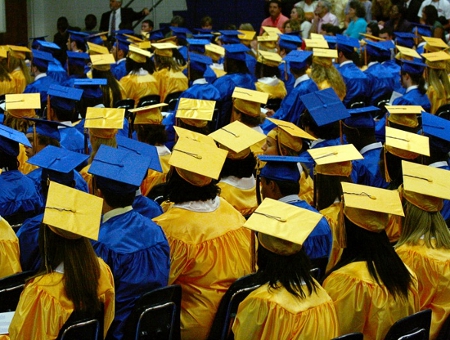Rise in College Applications Fuels Uncertainty

As anxious students hover by computer screens or mailboxes for news of college admissions, they face even more disappointment than even the record-breaking class of 2009. Though the number of high school seniors fell in many states last year, they keep applying to more schools. Many prestigious colleges saw applications swell by 7 percent or more for incoming freshman classes. Result: somewhat tougher competition, greater uncertainty, and an intensified national debate about the ethics of recruiting ever more applicants, the Los Angeles Times reports.
A recent study by the National Association for College Admission Counseling, for instance, found that median acceptance rates had dropped 10 percent at private, nonprofit four-year colleges and 7 percent at public schools from 2001 to 2008. Many experts expect that trend to continue this year, creating more stress for students and families, the report said. Continuing a decade-long trend, many competitive schools reported increases in applications this admission season. USC says its applications are up 3 percent; Stanford University, 7 percent; Boston College, 10% percent; Loyola Marymount University, 12 percent; and the University of Pennsylvania, 18 percent. In its first year of using the online Common Application, which makes it easier for students to apply to multiple schools, the University of Michigan‘s applications jumped 20 percent.
Some guidance counselors see the Common Application’s ease as contributing to the surge. This year’s 525,000 users applied on average to 4.53 campuses for the fall 2011 term, up from 4.32 for current college freshmen. UCLA researchers found that 17.8 percent of current college freshmen had applied to eight or more colleges, up from 15.9% the previous year. That makes it harder for colleges to figure out how many of the students they accept with actually attend. Another factor: colleges’ aggressive recruiting tactics, including waived fees and “no sweat” applications. By boosting applications, colleges can appear more “selective” when they must reject more of them, and thus boost their national rankings. Says Lloyd Thacker, executive director of the Education Conservancy, a think tank that has criticized admissions practices. “The commercialization of college admissions has created a crisis in distorting educational values.”
Filed under: K-12 Education News
Tags: College, Education Policy, Higher Education, Public Policy, Research








